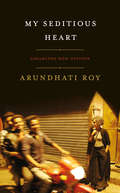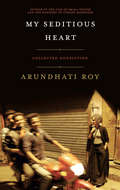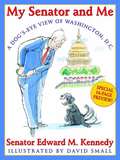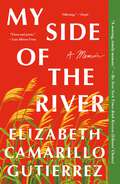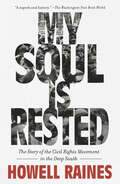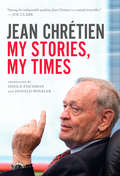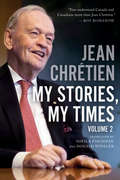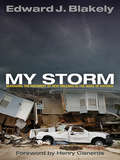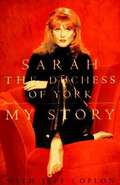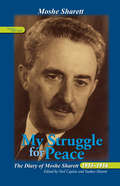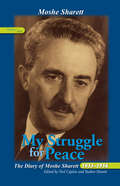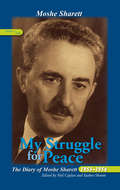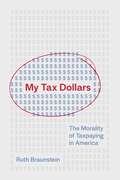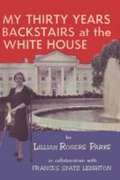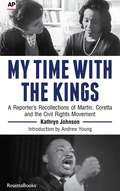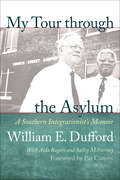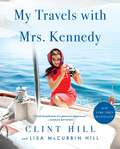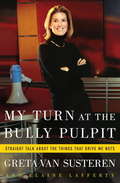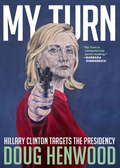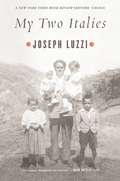- Table View
- List View
My Seditious Heart
by Arundhati RoyCollected essays and speeches from the bestselling, Booker-winning author of The Ministry of Utmost HappinessMy Seditious Heart collects the work of a two-decade period when Arundhati Roy devoted herself to the political essay as a way of opening up space for justice, rights, and freedoms in an increasingly hostile environment. Taken together, these essays trace her twenty year journey from the Booker Prize-winning The God of Small Things to the extraordinary The Ministry of Utmost Happiness: a journey marked by compassion, clarity, and courage. Radical and readable, they speak always in defence of the collective, of the individual, and of the land, in the face of the destructive logic of financial, social, religious, military, and governmental elites.In constant conversation with the themes and settings of her novels, the essays form a near-unbroken memoir of Arundhati Roy's journey as both a writer and a citizen, of both India and the world, from "The End of Imagination," which begins this book, to "Azadi," with which it ends.
My Seditious Heart: Collected Nonfiction
by Arundhati RoyTwo decades of commentary by the New York Times–bestselling author: &“An electrifying political essayist . . . uplifting . . . galvanizing.&” —Booklist From the Booker Prize-winning author of such works as The God of Small Things and The Ministry of Utmost Happiness, My Seditious Heart collects nonfiction spanning over twenty years and chronicles a battle for justice, rights, and freedoms in an increasingly hostile world. Taken together, these essays are told in a voice of unique spirit, marked by compassion, clarity, and courage. Radical and superbly readable, they speak always in defense of the collective, of the individual, and of the land, in the face of the destructive logic of financial, social, religious, military, and governmental elites. &“Her lucid and probing essays offer sharp insights on a range of matters, from crony capitalism and environmental depredation to the perils of nationalism and, in her most recent work, the insidiousness of the Hindu caste system. In an age of intellectual logrolling and mass-manufactured infotainment, she continues to offer bracing ways of seeing, thinking and feeling.&” —Pankaj Mishra, Time Magazine Praise for Arundhati Roy: &“Arundhati Roy combines her brilliant style as a novelist with her powerful commitment to social justice in producing these eloquent, penetrating essays.&” —Howard Zinn &“One of the most confident and original thinkers of our time.&” —Naomi Klein &“The scale of what Roy surveys is staggering. Her pointed indictment is devastating.&” —The New York Times Book Review
My Senator and Me: A Dog's-eye View of Washington, D.C.
by Edward M. KennedyThere's an old saying: "If you want a friend in Washington, get a dog." A few years ago, Senator Ted Kennedy decided to do just that. Now his dog, Champion Amigo's Seventh Wave (also known as Splash), is the most famous canine on Capitol Hill. Come follow Senator Kennedy and Splash through one whirlwind day in D.C.-from a press conference to a lunchtime game of fetch to a meeting with a school group to a vote on the Senate floor-as they work to pass an important law that will help schools across the United States. The warm, witty illustrations by Caldecott Medalist David Small offer a wonderful tour of the sights of Washington as well as an endearing portrait of the affection between man and dog. The result is a unique behind-the- scenes look at the life of one of the most energetic figures in American politics--and, of course, his very important owner.
My Side of the River: A Memoir
by Elizabeth Camarillo GutierrezA New York Times Editor's PickA People Magazine Best Book to Read in FebruaryA Goodreads Most Anticipated Book of 2024“My Side of the River is both fierce and poetic. It brilliantly reframes border writing while embracing nature and familial history. There are moments one sees greatness appear. This is one of those moments.” —Luis Alberto Urrea, New York Times bestselling author of Good Night, Irene Elizabeth Camarillo Gutierrez reveals her experience as the U.S. born daughter of immigrants and what happened when, at fifteen, her parents were forced back to Mexico in this captivating and tender memoir.Born to Mexican immigrants south of the Rillito River in Tucson, Arizona, Elizabeth had the world at her fingertips. She was preparing to enter her freshman year of high school as the number one student when suddenly, her own country took away the most important right a child has: the right to have a family. When her parents’ visas expired and they were forced to return to Mexico, Elizabeth was left responsible for her younger brother, as well as her education. Determined to break the cycle of being a “statistic,” she knew that even though her parents couldn’t stay, there was no way she could let go of the opportunities the U.S. could provide. Armed with only her passport and sheer teenage determination, Elizabeth became what her school would eventually describe as an unaccompanied homeless youth, one of thousands of underage victims affected by family separation due to broken immigration laws. For fans of Educated by Tara Westover and The Distance Between Us by Reyna Grande, My Side of the River explores separation, generational trauma, and the toll of the American dream. It’s also, at its core, a love story between a brother and a sister who, no matter the cost, is determined to make the pursuit of her brother’s dreams easier than it was for her.
My Sister’s Mother: A Memoir of War, Exile, and Stalin’s Siberia
by Donna Solecka UrbikasDonna Solecka Urbikas grew up in the Midwest during the golden years of the American century. But her Polish-born mother and half sister had endured dehumanizing conditions during World War II, as slave laborers in Siberia. War and exile created a profound bond between mother and older daughter, one that Donna would struggle to find with either of them.<P><P> In 1940, Janina Ślarzynska and her five-year-old daughter Mira were taken by Soviet secret police (NKVD) from their small family farm in eastern Poland and sent to Siberia with hundreds of thousands of others. So began their odyssey of hunger, disease, cunning survival, desperate escape across a continent, and new love amidst terrible circumstances.<P> But in the 1950s, baby boomer Donna yearns for a "normal" American family while Janina and Mira are haunted by the past. In this unforgettable memoir, Donna recounts her family history and her own survivor's story, finally understanding the damaged mother who had saved her sister.
My Soul is Rested: The Story of the Civil Rights Movement in the Deep South
by Howell Raines"A superb oral history." —The Washington Post Book World"So touching, so exhilarating...no book for a long time has left me so moved or so happy." —The New York Times Book ReviewThe almost unfathomable courage and the undying faith that propelled the Civil Rights Movement are brilliantly captured in these moving personal recollections. Here are the voices of leaders and followers, of ordinary people who became extraordinary in the face of turmoil and violence. From the Montgomery Bus Boycott in 1956 to the death of Martin Luther King, Jr., in 1968, these are the people who fought the epic battle: Rosa Parks, Andrew Young, Ralph Abernathy, Hosea Williams, Fannie Lou Hamer, and others, both black and white, who participated in sit-ins, Freedom Rides, voter drives, and campaigns for school and university integration.Here, too, are voices from the &“Down-Home Resistance&” that supported George Wallace, Bull Connor, and the &“traditions&” of the Old South—voices that conjure up the frightening terrain on which the battle was fought. My Soul Is Rested is a powerful document of social and political history, as well as a magnificent tribute to those who made history happen.
My Stories, My Times
by Jean Chretien Sheila Fischman Donald WinklerOne of the most popular Canadian prime ministers in recent history, elected to government for three consecutive majority terms, Jean Chrétien has some stories to tell. Recounted with warmth, insight and his distinctive sense of humour, these brief and candid essays feature many behind-the-scenes stories from a long, distinguished and colourful career. The book also features two sixteen-page colour photo inserts.October 2018 marks twenty-five years since Jean Chrétien took the helm as prime minister. In this collection of short essays, he has picked up his pen to reminisce about his long years in the public eye, and the many luminaries he met and worked with. Readers will learn why his commonsense judgment continues to influence our lives to this day, in ways both profound and subtle: from forging long-lasting relationships with foreign countries to making it easy to identify our national airline when we travel. He recalls a memorable trip with the royal family to the Northwest Territories in 1970, and how Ross Perot tried to influence his views on free trade in 1992. Of course, many familiar names figure in these stories, including George W. Bush, Boris Yeltsin, Tony Blair, Jacques Chirac, Pierre Trudeau, and Bill and Hillary Clinton. There are reflections on the many different posts over Chrétien's career, including becoming Canada's first-ever francophone finance minister. He pays tribute to old friends and colleagues, where the values of honour and dedication to public service transcend political views. He reserves his greatest admiration for his wife of more than sixty years, Aline, whom he calls his Rock of Gibraltar. These stories offer his unique perspective: we are at the Prime Minister's side on 9/11 when he is asked to give authorization to shoot down a passenger airliner that has not responded to identification requests. We learn how he attempted to correct the record as explained in his grandson's history book on the so-called "Night of the Long Knives." (Despite having special access to an eyewitness to history, his grandson got a failing grade on his paper.) There are even glimpses of the young Jean, as a teen canvassing with his father, and as a young man who dared complain personally to Premier Maurice Duplessis about the food at his seminary. Survival in politics requires stamina, creativity and toughness, as well as the ability to share a laugh now and again: qualities that the self-described "little guy from Shawinigan" never lost. In these days of "alternative facts" and politics-by-Tweet, these stories are a necessary antidote, told by a leader who always held fast to his vision of what Canada was and what it could be.
My Stories, My Times, Volume 2
by Jean ChretienFollowing on the heels of his bestselling collection of political reminiscences, former Canadian prime minister Jean Chrétien still has a few more stories to tell. With anecdotes and reflections both serious and light-hearted, My Stories, My Times, Volume 2 is a unique window on our country from one of its greatest statesmen and patriots. With a career that spanned decades and an active retirement after that, it should come as no surprise that Jean Chrétien&’s illuminating, perceptive and often humorous stories could not be contained in just one book. This collection of essays features his trademark candour and ever-sharp political acumen, with plenty of wit to accompany the wisdom. With a delightful randomness, he remembers events and personalities that shaped our nation in a multitude of ways, and offers his views on international current events, including Canada-China relations, Brexit, and interprovincial dealings. Jean Chrétien&’s stories serve to remind us that there is more to unite than divide us as a country, and that we have institutions we can take enormous pride in and values we must strive to maintain and keep building upon. Above all, these stories illustrate Jean Chrétien&’s firm belief that we must never cease searching for common ground despite our differences.
My Storm
by Edward J. Blakely Henry CisnerosEdward J. Blakely has been called upon to help rebuild after some of the worst disasters in recent American history, from the San Francisco Bay Area's 1989 Loma Prieta earthquake to the September 11 attacks in New York. Yet none of these jobs compared to the challenges he faced in his appointment by New Orleans Mayor Ray Nagin as Director of the Office of Recovery and Development Administration following Hurricane Katrina.In Katrina's wake, New Orleans and the Gulf Coast suffered a disaster of enormous proportions. Millions of pounds of water crushed the basic infrastructure of the city. A land area six times the size of Manhattan was flooded, destroying 200,000 homes and leaving most of New Orleans under water for 57 days. No American city had sustained that amount of destruction since the Civil War. But beneath the statistics lies a deeper truth: New Orleans had been in trouble well before the first levee broke, plagued with a declining population, crumbling infrastructure, ineffective government, and a failed school system. Katrina only made these existing problems worse. To Blakely, the challenge was not only to repair physical damage but also to reshape a city with a broken economy and a racially divided, socially fractured community.My Storm is a firsthand account of a critical sixteen months in the post-Katrina recovery process. It tells the story of Blakely's endeavor to transform the shell of a cherished American city into a city that could not only survive but thrive. He considers the recovery effort's successes and failures, candidly assessing the challenges at hand and the work done--admitting that he sometimes stumbled, especially in managing press relations. For Blakely, the story of the post-Katrina recovery contains lessons for all current and would-be planners and policy makers. It is, perhaps, a cautionary tale.
My Story
by Sarah Ferguson Jeff CoplonWhen Sarah Ferguson first surfaced as the woman Prince Andrew would marry, she was celebrated by the public as a breath of fresh air inside stuffy Buckingham Palace. But reality set in, and the very natural and candid Sarah became her own worst enemy. In MY STORY, Sarah looks back on her failed marriage and takes responsibility for her part in what went wrong.
My Struggle for Peace, Volume 1: The Diary of Moshe Sharett, 1953–1956 (The Diary of Moshe Sharett, 1953–1956 #1)
by Moshe SharettThe first volume of the former Israeli prime minister’s journals from the nation’s early years.My Struggle for Peace is a remarkable political document offering insights into the complex workings of the young Israeli political system, set against the backdrop of the disintegration of the country’s fragile armistice with the Arab states. Replete with Moshe Sharett’s candid comments on Israel’s first-generation leaders and world statesmen of the day, the diary also tells the dramatic human story of a political career cut short—the removal of an unusually sensitive, dedicated, and talented public servant. My Struggle for Peace is, above all, an intimate record of the decline of Sharett’s moderate approach and the rise of more “activist-militant” trends in Israeli society, culminating in the Suez/Sinai war of 1956. The diary challenges the popular narrative that Israel’s confrontation with its neighbors was unavoidable by offering daily evidence of Sharett’s statesmanship, moderation, diplomacy, and concern for Israel’s place in international affairs.This is the first volume in the 3-volume English abridgement of Sharett’s Yoman Ishi [Personal diary] (Ma’ariv, 1978) maintains the integrity, flavor, and impact of the 8-volume Hebrew original and includes additional documentary material that was not accessible at the time. The volumes are also available to purchase as a set or individually.“The editors . . . vastly improved on the Hebrew version by adding Sharett’s speeches, reports, cabinet minutes, and other sources to the text’. . . . These additions makes this work so important and welcome by all who aspire to understand the foreign and defense policies of Israel in its first decade.” —Israel Studies Review
My Struggle for Peace, Volume 2: The Diary of Moshe Sharett, 1953–1956 (The Diary of Moshe Sharett, 1953–1956 #2)
by Moshe SharettThe second volume of the former Israeli prime minister&’s journals from the nation&’s early years, centering on his time in office.My Struggle for Peace is a remarkable political document offering insights into the complex workings of the young Israeli political system, set against the backdrop of the disintegration of the country&’s fragile armistice with the Arab states. Replete with Moshe Sharett&’s candid comments on Israel&’s first-generation leaders and world statesmen of the day, the diary also tells the dramatic human story of a political career cut short—the removal of an unusually sensitive, dedicated, and talented public servant. My Struggle for Peace is, above all, an intimate record of the decline of Sharett&’s moderate approach and the rise of more &“activist-militant&” trends in Israeli society, culminating in the Suez/Sinai war of 1956. The diary challenges the popular narrative that Israel&’s confrontation with its neighbors was unavoidable by offering daily evidence of Sharett&’s statesmanship, moderation, diplomacy, and concern for Israel&’s place in international affairs. This is the second volume in the 3-volume English abridgement of Sharett&’s Yoman Ishi [Personal diary] (Ma&’ariv, 1978) maintains the integrity, flavor, and impact of the 8-volume Hebrew original and includes additional documentary material that was not accessible at the time. The volumes are also available to purchase as a set or individually.&“The editors . . . vastly improved on the Hebrew version by adding Sharett&’s speeches, reports, cabinet minutes, and other sources to the text. . . . These additions makes this work so important and welcome by all who aspire to understand the foreign and defense policies of Israel in its first decade.&” —Israel Studies Review
My Struggle for Peace, Volume 3: The Diary of Moshe Sharett, 1953–1956 (The Diary of Moshe Sharett, 1953–1956 #3)
by Moshe SharettThe third volume of the former Israeli prime minister&’s journals from the nation&’s early years.My Struggle for Peace is a remarkable political document offering insights into the complex workings of the young Israeli political system, set against the backdrop of the disintegration of the country&’s fragile armistice with the Arab states. Replete with Moshe Sharett&’s candid comments on Israel&’s first-generation leaders and world statesmen of the day, the diary also tells the dramatic human story of a political career cut short—the removal of an unusually sensitive, dedicated, and talented public servant. My Struggle for Peace is, above all, an intimate record of the decline of Sharett&’s moderate approach and the rise of more &“activist-militant&” trends in Israeli society, culminating in the Suez/Sinai war of 1956. The diary challenges the popular narrative that Israel&’s confrontation with its neighbors was unavoidable by offering daily evidence of Sharett&’s statesmanship, moderation, diplomacy, and concern for Israel&’s place in international affairs. This is the third volume in the 3-volume English abridgement of Sharett&’s Yoman Ishi [Personal diary] (Ma&’ariv, 1978) maintains the integrity, flavor, and impact of the 8-volume Hebrew original and includes additional documentary material that was not accessible at the time. The volumes are also available to purchase as a set or individually.&“The editors . . . vastly improved on the Hebrew version by adding Sharett&’s speeches, reports, cabinet minutes, and other sources to the text. . . . These additions makes this work so important and welcome by all who aspire to understand the foreign and defense policies of Israel in its first decade.&” —Israel Studies Review
My Struggle for Peace, Volume 3: The Diary of Moshe Sharett, 1953–1956 (The Diary of Moshe Sharett, 1953–1956)
by Moshe SharettThe third volume of the former Israeli prime minister&’s journals from the nation&’s early years.My Struggle for Peace is a remarkable political document offering insights into the complex workings of the young Israeli political system, set against the backdrop of the disintegration of the country&’s fragile armistice with the Arab states. Replete with Moshe Sharett&’s candid comments on Israel&’s first-generation leaders and world statesmen of the day, the diary also tells the dramatic human story of a political career cut short—the removal of an unusually sensitive, dedicated, and talented public servant. My Struggle for Peace is, above all, an intimate record of the decline of Sharett&’s moderate approach and the rise of more &“activist-militant&” trends in Israeli society, culminating in the Suez/Sinai war of 1956. The diary challenges the popular narrative that Israel&’s confrontation with its neighbors was unavoidable by offering daily evidence of Sharett&’s statesmanship, moderation, diplomacy, and concern for Israel&’s place in international affairs. This is the third volume in the 3-volume English abridgement of Sharett&’s Yoman Ishi [Personal diary] (Ma&’ariv, 1978) maintains the integrity, flavor, and impact of the 8-volume Hebrew original and includes additional documentary material that was not accessible at the time. The volumes are also available to purchase as a set or individually.&“The editors . . . vastly improved on the Hebrew version by adding Sharett&’s speeches, reports, cabinet minutes, and other sources to the text. . . . These additions makes this work so important and welcome by all who aspire to understand the foreign and defense policies of Israel in its first decade.&” —Israel Studies Review
My Tax Dollars: The Morality of Taxpaying in America
by Ruth BraunsteinWhen the mundane reality of paying taxes takes on moral significanceIn My Tax Dollars, Ruth Braunstein maps the contested moral landscape in which Americans experience and make sense of the tax system. Braunstein tells the stories of Americans who view taxpaying as more than a mundane chore: antigovernment tax defiers who challenge the legitimacy of the tax system, antiwar activists who resist the use of their taxes to fund war, antiabortion activists against &“taxpayer funded abortions,&” and a diverse group of people who promote taxpaying as a moral good.Though taxpaying is often portrayed as dull and technical, exposure to collective rituals, civic education, propaganda, and protest transforms the practice for many Americans into either a sacred rite of citizenship or a profane threat to what they hold dear. These sacred and profane meanings can apply to the act of taxpaying itself or to the specific uses of tax dollars. Despite intense disagreement about these meanings, politically diverse Americans engaged in both taxpaying and tax resistance valorize the individual taxpayer and &“my tax dollars.&”Braunstein explores the profound implications of this meaning making for tax consent, the legitimacy of the tax system, and citizens&’ broader understandings of their political relationships. Going beyond the usual focus on tax policy, Braunstein&’s innovative view of taxation through the lens of cultural sociology shows how citizens in value-diverse societies coalesce around shared visions of the sacred and fears of the profane.
My Ten Years as a Counterspy
by Boris Morros Charles SamuelsBoris Morros was a successful Hollywood producer and a highly regarded musician and impresario. His life had been a legendary success story even in the flamboyant annals of show business. What chain of events in 1936 led him into serving the interests of a Soviet spy ring? What even more dramatic events brought him into the office of the FBI in 1947 to take on the role of a United States counterspy? How did Morros manage to deceive Communist agents and help provide the evidence which resulted, in the exposure and conviction of the, leaders of the spy ring? This book, for the first time, unfolds the entire drama of the ten-year ordeal of Boris Morros.
My Thirty Years Backstairs at the White House
by Lillian Rogers Parks Frances Spatz LeightonThis book should be required reading for every serious student of American history. The authors were eye witnesses to some of the great events of history and offer different perspectives from that found elsewhere. The unique perspective offered by this book arises from the fact that the authors are two White House domestic servants, each of whom worked for 30 years in the White House. As there was an overlap of ten years that both of them worked there together, that means that they were in the White House for a 51-year span from the end of 1909 until 1960, when Lillian Rogers Parks retired at age 64 in the concluding days of the Eisenhower Administration.
My Time with the Kings: A Reporter’s Recollections of Martin, Coretta and the Civil Rights Movement
by Andrew Young Kathryn Johnson“Let Kathryn in,” said Coretta Scott King to authorities.Three simple words that provided Kathryn Johnson, a reporter for The Associated Press’s Atlanta bureau, unprecedented access to the grieving widow in the days following her husband’s death.Johnson was on her way to a movie date when word came from Memphis that Martin Luther King Jr. had been assassinated. She immediately headed for the King home where, despite resistance from authorities on the scene, she was the only reporter allowed inside. Johnson’s many years covering King and his family had earned her the trust to be a discreet, observant witness to the aftermath of a defining moment in American history.Kathryn Johnson covered the civil rights movement across the South in the 1960s, often risking her own safety to observe first-hand the events of this great era. Her stories took her from witnessing the integration of the University of Georgia by dressing as a student, to hiding unobserved under a table near an infamous schoolhouse door in Alabama, to marching with the massive crowd from Selma to Montgomery.Johnson, one of the only female reporters on the scene, threw herself into charged situations with a determination to break the news no matter what. Including never-before-published photos, her personal account of this period is a singular addition to the story of the civil rights movement.
My Tour through the Asylum: A Southern Integrationist's Memoir
by Aïda Rogers William E. Dufford Salley McInerney“[A] testament to his journey toward South Carolina’s—not only desegregation of schools—but full integration and voice for African American students.” —Libby Bernardin, author of Stones Ripe for SowingImmortalized in the writings of his most famous student, bestselling author Pat Conroy, veteran education administrator William E. Dufford has led an inspirational life as a stalwart champion for social justice and equal access for all to the empowerment of a good public education. A quintessential Southern storyteller now in his nineties, Dufford reflects on his own transformation through education, from his upbringing in the segregationist Jim Crow Era-South of the 1930s and 1940s to becoming an accomplished integrationist revered by his pantheon of former colleagues and students. In My Tour through the Asylum, several of these supporters share their own candid recollections of Dufford alongside his life story, adding context and anecdotes to the narrative.Dufford credits the evolution of his mindset from segregationist to integrationist to the good influence of two experiences: his service in the US Navy in the 1940s opening his eyes to a larger worldview and his later doctoral training at the University of Florida under nationally recognized professors introducing him to global perspectives of education.Drawing the book title and themes from nineteenth-century statesman James Louis Petigru’s infamous assessment that South Carolina was “too small to be a republic and too big to be an insane asylum,” Dufford offers an insightful, pragmatic, and ultimately hopeful tour through his lived experiences in the courageous, committed service of education and enlightenment.“William Dufford’s memoir is a remarkable example of courage, passion, and determination.” —Peggy B. Winder, Newberry College
My Travels with Mrs. Kennedy
by Clint Hill Lisa McCubbin HillNEW YORK TIMES BESTSELLER The #1 New York Times bestselling authors of Mrs. Kennedy and Me reveal never-before-told stories of Secret Service Agent Clint Hill&’s travels with Jacqueline Kennedy through Europe, Asia, and South America. Featuring more than two hundred rare and never-before-published photographs.While preparing to sell his home in Alexandria, Virginia, retired Secret Service agent Clint Hill uncovers an old steamer trunk in the garage, triggering a floodgate of memories. As he and Lisa McCubbin, his coauthor on three previous books, pry it open for the first time in fifty years, they find forgotten photos, handwritten notes, personal gifts, and treasured mementos from the trips on which Hill accompanied First Lady Jacqueline Kennedy as her Secret Service agent—trips that took them from Paris to London, through India, Pakistan, Greece, Morocco, Mexico, South America, and &“three glorious weeks on the Amalfi Coast.&” During these journeys, Jacqueline Kennedy became one of her husband&’s—and America&’s—greatest assets; in Hill&’s words and the opinion of many others, &“one of the best ambassadors the United States has ever had.&” As each newfound treasure sparks long-suppressed memories, Hill provides new insight into the intensely private woman he always called &“Mrs. Kennedy&” and who always called him &“Mr. Hill.&” For the first time, he reveals the depth of the relationship that developed between them as they traveled around the globe. Now ninety years old, Hill recounts the tender moments, the private laughs, the wild adventures, and the deep affection he shared with one of the world&’s most beautiful and iconic women—and these memories are brought vividly to life alongside more than two hundred rare photographs, many of them previously unpublished. In addition to the humorous stories and intimate moments, Hill reveals startling details about how traveling helped them both heal during the excruciating weeks and months following the assassination of President John F. Kennedy in November 1963. He also writes of the year he spent protecting Mrs. Kennedy after the assassination, a time in his life he has always been reluctant to speak about. My Travels with Mrs. Kennedy unveils a personal side of history that has never been told before and takes the reader on a breathtaking journey, experiencing what it was like for Clint Hill to travel with Jacqueline Kennedy as the entire world was falling in love with her.
My Turn at the Bully Pulpit: Straigh Talk About the Things That Drive Me Nuts
by Greta Van Susteren Elaine LaffertyWelcome to the bully pulpit where opinions fly but common sense rules. Here’s where you’ll find straight talk about the most pressing issues of the day, all delivered in the trademark commonsense style of one of America’s most popular and admired television news anchors. Always resisting the political label that attempts to place people in one ideological camp or another, Greta Van Susteren speaks from the mind and the heart, not as a liberal or a conservative, but as a right-thinking, sensible citizen. “Our country is at a critical juncture,” she writes, and “too many of us are caught up in old definitions of left and right that no longer apply. If I favor the death penalty in some cases, does that make me right-wing? If I think hate crimes legislation is stupid, does that make me a conservative? If I happen to like and enjoy Ozzy Osbourne and have him on my show, does that make me a liberal? And if I believe that corporations should be held accountable if their products harm citizens and they should be subject to the rulings of a jury—ditto for doctors who commit medical malpractice—does that make me a lefty trial lawyer?”Here’s more of Greta in her own words:On the military: Liberty isn’t free. As a nation, we must provide for the men and women who put their lives on the line for us. That means good pay, adequate funding for defense, and our heartfelt support. Vietnam was a very long time ago. We Baby Boomers have to wake up and realize that today’s military is a different military from the one we grew up with, and we are fighting a very different war. Patriotism is not a conservative or a liberal thing. Patriotism, as far as I am concerned, is the duty and obligation of every American.On the Supreme Court: There should be a litmus test for Supreme Court and federal court judges, and that test should be their opinion about allowing public access to court proceedings. Let cameras inside the courthouse, or at least allow an audio feed to radio. What are they hiding?On the death penalty: It should be legal and available to courts and juries . . . but it should be used extremely rarely, and only when we are absolutely certain that a fair trial has taken place.On how you look: It’s your business and nobody else’s. Your looks and your life are not a democracy—not everybody gets a vote. Make your appearance and your choices a totalitarian regime—you are the boss.On fun: It isn’t a curse word. It’s actually quite serious business, as it makes the hard times livable and the sad times bearable. Fun should be part of a work environment, too. Stuffed shirts and snobs who can’t stop and laugh at themselves should be banished!In Greta’s company you’re guaranteed to get a fresh dose of common sense and a good hearty rant on many of the most important issues we face today. One more guarantee: you’ll have some good fun while you’re at it.
My Turn: Hillary Clinton Targets the Presidency
by Doug Henwood"I REPRESENTED WALL STREET, AS A SENATOR FROM NEW YORK." --Hillary Clinton, October 2015, during the first Democratic TV debate HILLARY CLINTON is running for the presidency with a message of hope and change. But, as Doug Henwood makes clear in this concise, devastating indictment, little trust can be placed in her campaign promises. Rigorously reviewing her record, Henwood shows how Clinton's positions on key issues have always blown with the breeze of expediency, though generally around an axis of moralism and hawkishness. Without a meaningful program other than a broad fealty to the status quo, Henwood suggests, "the case for Hillary boils down to little more than her alleged inevitability." DOUG HENWOOD is a journalist and financial analyst, who publishes two newsletters, Left Business Observer and (together with Philipa Dunne) The Liscio Report. He is a contributing editor at The Nation and the author of three previous books: The State of the USA Atlas, Wall Street and After the New Economy.
My Turn: Hillary Clinton Targets the Presidency
by Doug HenwoodHillary Clinton is running for the presidency with a message of hope and change. But, as Doug Henwood makes clear in this concise, devastating indictment, little trust can be placed in her campaign promises. Rigorously reviewing her record, Henwood shows how Clinton's positions on key issues have always blown with the breeze of expediency, though generally around an axis of moralism and hawkishness. Without a meaningful program other than a broad fealty to the status quo, Henwood suggests, "the case for Hillary boils down to this: she has experience, she's a woman, and it's her turn."From the Trade Paperback edition.
My Two Italies
by Joseph LuzziThe child of Italian immigrants and an award-winning scholar of Italian literature, Joseph Luzzi straddles these two perspectives in My Two Italies to link his family's dramatic story to Italy's north-south divide, its quest for a unifying language, and its passion for art, food, and family. <P><P>From his Calabrian father's time as a military internee in Nazi Germany—where he had a love affair with a local Bavarian woman—to his adventures amid the Renaissance splendor of Florence, Luzzi creates a deeply personal portrait of Italy that leaps past facile clichés about Mafia madness and Tuscan sun therapy. He delves instead into why Italian Americans have such a complicated relationship with the "old country," and how Italy produces some of the world's most astonishing art while suffering from corruption, political fragmentation, and an enfeebled civil society. <P><P>With topics ranging from the pervasive force of Dante's poetry to the meteoric rise of Silvio Berlusconi, Luzzi presents the Italians in all their glory and squalor, relating the problems that plague Italy today to the country's ancient roots. He shares how his "two Italies"—the earthy southern Italian world of his immigrant childhood and the refined northern Italian realm of his professional life—join and clash in unexpected ways that continue to enchant the many millions who are either connected to Italy by ancestry or bound to it by love.
